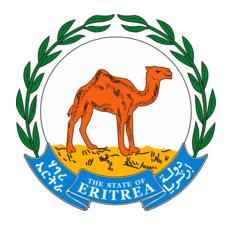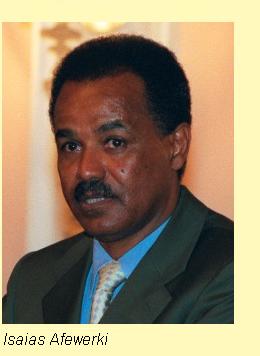

REPUBLIC OF ERITREA
• Official name: Hagere Eretra / al-Dawla al-Iritra (Republic of Eritrea)
• Location: East Africa
• International organisations: African, Caribbean and Pacific Group of States, African Union,
Non-Aligned Movement, Organisation of Islamic Conference, United Nations
• Borders: Djibouti, Ethiopia, Sudan
• Coastline: Red Sea
• Land area: 121,320 Km2
• Population: 5,700,000
• Annual GDP (PPP) per capita: US$700 (2009 CIA estimate). World ranking: 187
• Ethnicity: Tigrinya 50%, Tigre and Kunama 40%, Afar 4%, Saho 3%
• Languages: Tigray and Arabic are the official languages, though few people
speak Arabic as their first language. Tigray and the
closely related Tigrinya are spoken by about 75%. Minority languages include
Afar, Amharic, Bedawi, Kunama and Saho.
• Religion: About half the population are Sunni Moslems. The remainder are
divided between Coptic, Ethiopian Orthodox and Catholic Christianity.
• Form of government: Dictatorship. Eritrea is divided into six regions.
• Capital: Asmara
• Constitution: The
Constitution of the Republic of Eritrea came into effect on 24 May 1993, but has never been put into effect.
• Head of state: The President, chosen by the legislature for a five-year term.
President Afworki
Isaias was elected on 8 June 1993, but no election has been held since.
• Head of government: The President, who appoints all ministers.
• Legislature: The Constitution specifies that there will be a National Assembly (Hagerawi Baito),
but does not specify its size, composition
or term, other than to say that "The National Assembly shall be composed of
representatives elected by the people."
The current "Transitional Assembly" consists of
75 members of the People's Front for Democracy and
Justice Central Committee, 60 members drawn from the (unelected) Constituent Assembly
which met in 1997 to ratify the Constitution,
and 15 representatives of Eritreans living abroad. This assembly has existed
since 1997, and no elections have been held.
• Electoral authority: None
• Freedom House rating: Political Rights 7, Civil Liberties 6

Political history
The Eritrean coast was subject to the Emperor of Ethiopia until the 16th century,
when it came under Ottoman control. From 1865 it was nominally part of the Ottoman
province of Egypt. In 1882 the Italians took over the port of Assab, and gradually
extended their control until they annexed the whole area as the Colony of Eritrea
in 1890. When Italy conquered Ethiopia in 1936, Eritrea was federated with it
to form Italian East Africa.
The Italians were evicted by the British army in 1941, and the British ran
the area until 1952, when the United Nations approved an agreement to federate
Eritrea with Ethiopia. Eritrea was promised self-government under the Ethiopian
crown. The Ethiopians reneged on this agreement in 1962 and Eritrea became an integral
part of Ethiopia.
Armed resistance to Ethiopian rule began in 1965, and continued for 25 years,
led by the Eritrean People's Liberation Front (EPLF), a Marxist group. The
collapse of the communist regime in Ethiopia led to a recognition of
Eritrean independence, and a provisional government was established in May 1991.
The
EPLF, renamed the People's Front for Democracy
and Justice,
took power, and formal independence followed in May 1993.
Although a constitution was adopted, the PFDJ established a one-party
state on traditional African socialist lines, with the PFDJ leader
Isaias Afewerki as president. In 1998 border disputes with Ethiopia led to a two-year
war which was very costly to both countries. There is no indication that the PFDJ intends allowing
progress towards democracy.
Freedom House's 2009
report on Eritrea
says: "Eritrea is not an electoral democracy. [The PFDJ] maintains complete dominance over the
country's political life. Instead of moving toward a democratic political system, the PFDJ has taken
significant steps backward... In 2008, the Eritrean leadership showed no sign of relaxing its iron
grip on the country's political and social structures... Eritrea long maintained a reputation for a
relatively low level of corruption. In recent years, however, graft appears to have increased
somewhat. Eritrea was ranked 126 out of 180 countries surveyed in Transparency International's 2008
Corruption Perceptions Index... Government control over all broadcasting outlets and the repression
of independent print publications have eliminated the vehicles for dissemination of opposing or
alternative views... Freedom of assembly does not exist. The government continues to maintain a hostile
attitude toward civil society... A judiciary, which was formed by decree in 1993, has never issued
rulings significantly at variance with government positions."
Updated February 2010
|

